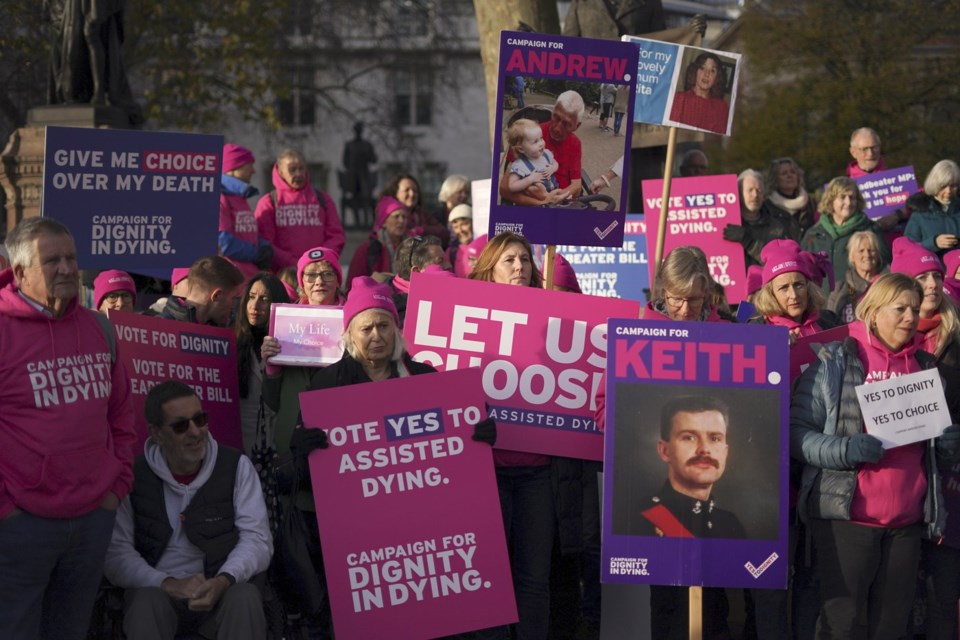LONDON (AP) — British lawmakers gave initial approval Friday to a in England and Wales following an impassioned debate that saw personal stories of loss and suffering shared.
Members of Parliament approved the assisted dying bill by a vote of 330 to 275, a majority of 55. The vote signals lawmakers’ approval in principle for the bill, which is now sent on to further scrutiny in Parliament before it faces a final vote by lawmakers.
The vote came after hours of debate — emotional at times — that touched on issues of ethics, grief, the law, faith, crime and money.
During the debate, hundreds of people on both sides of the issue gathered outside Parliament. Supporters said the law would provide dignity to the dying and prevent unnecessary suffering, while ensuring there are enough safeguards to prevent those near the end of their lives from being coerced into taking their own life.
Opponents said it would put vulnerable people at risk, potentially coerced, directly or indirectly, to end their lives so they don’t become a burden.
The proposed bill would allow adults over the age of 18 who are expected to have fewer than six months to live to request and be provided with help to end their life, subject to safeguards and protections. They would have to be capable of taking the fatal drugs themselves, and two doctors and a High Court judge will have to sign off on any decision.
Backers of the bill told heart-wrenching stories about constituents and family members who suffered in the final months of their lives and dying people who committed suicide in secret because it is currently a crime for anyone to provide assistance.
“Let’s be clear, we’re not talking about a choice between life or death, we are talking about giving dying people a choice about how to die,” the bill’s main sponsor, Kim Leadbeater, said as she presented the bill to a packed chamber.
She conceded that it wasn't an easy decision for lawmakers but that “if any of us wanted an easy life, they’re in the wrong place.”
Those opposed spoke of the danger that vulnerable, elderly and disabled people could be coerced into opting for assisted dying to save money or relieve the burden on family members. Others called for the improvement of palliative care to ease suffering as an alternative.
Danny Kruger, who led the argument against the bill, had cautioned lawmakers not to back a “state suicide service." He argued that no amount of safeguards will stop many vulnerable people feeling the pressure to make a request to bring their lives to an end.
Kruger voiced his disappointment at the outcome but said there's a chance that lawmakers will reject the bill when it comes back for a vote in the next few months. Many of those voting in favor on Friday said they only did so as they wished to examine the details further and could potentially vote in a different way in the future.
“I still think we can stop it,” he said.
Although the bill was proposed by Leadbeater, a member of the ruling center-left Labour Party, it was an open vote with alliances formed across the political divide.
The government is widely expected to come up in the next few months with assessments on how assisted dying will be funded and how it will impact the U.K.'s state-funded public health service, hospice care and the legal system.
Prime Minister Keir Starmer did not show his hand ahead of the vote, but backed the change. Others in his Cabinet, including Health Secretary Wes Streeting and the Justice Minister Shabana Mahmood, voted against. There were similar divisions across other political parties.
Long-time British campaigner Esther Rantzen, who is terminally ill with lung cancer and played a leading role in advocating the need for a vote on assisted dying, voiced her joy at the “wonderful” outcome and said it will give people an “equal choice.”
When diagnosed with her terminal illness, Rantzen said she would travel to Switzerland to bring an end to her life, where the law allows assisted dying for non-residents.
Other countries that have legalized assisted suicide include Australia, Belgium, saąúĽĘ´«Ă˝ and parts of the United States, with regulations on who is eligible varying by jurisdiction.
Assisted suicide is different from euthanasia, allowed in the Netherlands and , which involves health care practitioners administering a lethal injection at the patient's request in specific circumstances.
Brian Melley And Pan Pylas, The Associated Press


